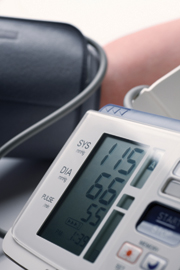High Blood Pressure
 Everyone has blood pressure. It is the pressure of blood against the walls of your blood vessels (or arteries) as the heart pumps blood around your body. Your blood pressure will increase and decrease depending on what you are doing. When you are exercising, nervous or stressed your blood pressure will increase and it will decrease when you are sitting or sleeping. High blood pressure is when your blood pressure is persistently higher than normal even at resting state (also known as hypertension).
Everyone has blood pressure. It is the pressure of blood against the walls of your blood vessels (or arteries) as the heart pumps blood around your body. Your blood pressure will increase and decrease depending on what you are doing. When you are exercising, nervous or stressed your blood pressure will increase and it will decrease when you are sitting or sleeping. High blood pressure is when your blood pressure is persistently higher than normal even at resting state (also known as hypertension).
According to Australian Health Survey, in 2011-12, almost one-third of all adult Australians had hypertension. Of these, almost half (48.8%) self-reported having a current and long-term heart or circulatory condition. Men were more likely to have hypertension than women. Hypertension was significantly more prevalent at older ages, with almost 9 in 10 people aged 85 years and over having hypertension.
Blood pressure is measured in millimetres of mercury (mmHg). Your blood pressure is recorded as two figures, for example 120 over 80 (120/80). The top number is the pressure in the arteries when the heart squeezes blood out during each beat. The lower number is the pressure in the arteries when the heart rests between each heartbeat. It is best to measure blood pressure when you are relaxed, and sitting or lying down. Readings over 120/80 mmHg and up to 139/89 mmHg are in the normal to high normal range.
- A blood pressure reading under 120/80 mmHg is considered optimal.
- Readings over 120/80 mmHg and up to 139/89 mmHg are in the normal to high normal range.
- High blood pressure is greater than 140/90 mmHg and if you have blood pressure above 180/110 mmHg, your blood pressure is very high.
High blood pressure (hypertension) increases your chance of developing heart disease, a stroke, blood vessel disease, damage to the retina of the eye, kidney disease and/or other serious conditions. Generally, the higher the blood pressure the greater the health risks. It is important to get your blood pressure checked regularly, because you may have no symptoms or signs of high blood pressure but still have hypertension.
Your blood pressure may be strongly influenced by:
- family history
- eating patterns
- alcohol intake
- weight
- physical activity.
Some medicines can also raise blood pressure (talk to your pharmacist).
Treatment for hypertension often includes lifestyle changes. These changes may include losing weight (if overweight), regular physical activity, a healthy diet, cutting back if you drink a lot of alcohol, discontinuing smoking, a low-salt diet and reduced caffeine intake. If needed, there are medicines which can lower blood pressure.
It is important to have your blood pressure checked regularly by a health professional, such as a pharmacist. If you want to ‘know your numbers’ visit your local pharmacy, your health destination.
At Fresh Therapeutics we can take your blood pressure by means of easy-to-use, painless blood pressure machines. We use blood pressure machines that can also detect Atrial Fibrillation. People with atrial fibrillation have a higher risk of stroke. At Fresh Therapeutics we sit down with you to explain your readings, offer advice on how to lower and maintain lower blood pressure and refer you to a doctor if further testing is required.
We also have more detailed information on hypertension and health advice in Self Care Fact Cards titled High blood pressure, Exercise and the heart, Weight and health, and Smoking.


